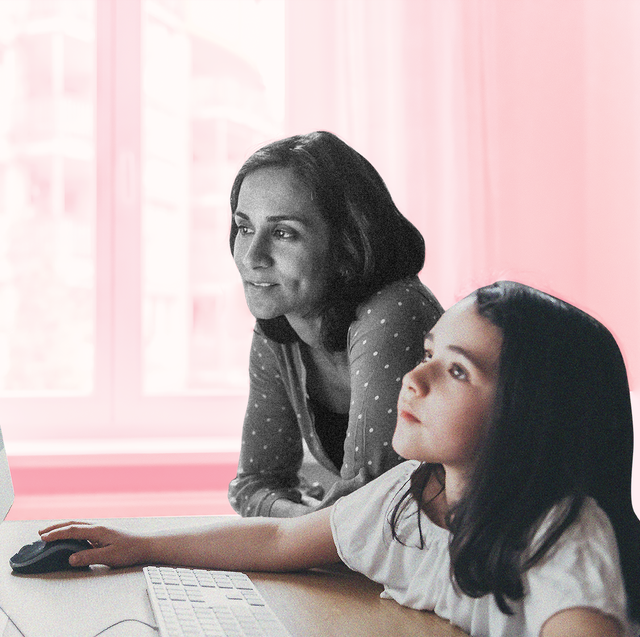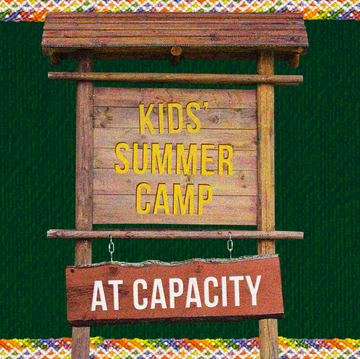Child development experts have already firmly established why helicopter parenting and lawnmower parenting — or swooping in to rescue our kids from every problem — is harmful. Overly involved parenting jeopardizes kids’ independence and resilience, not to mention parents’ sanity. Yet months into a pandemic that’s forcing physical classrooms to remain closed, the unescapable proximity has caused many parents to struggle. It can be hard to let children muddle through the challenges of virtual school without intervening.
Earlier this fall in Berkeley, California, Allison Landa went to check on her 5-year-old son, a transitional kindergartener who is learning remotely. When Landa saw her child wasn’t following the teacher’s instructions to draw dots on a page, she decided to jump in. “I took the crayon and helped him swirl it on the page. Then I drew a dot of my own. Then I quizzed him: What color was the dot? How big was it?”
Across the country in upstate New York, Emily Popek was helping her third grader, who was suddenly the host of her class Zoom meeting after a glitch kicked the teacher out. Looking at the screen, Popek saw her daughter’s classmates — and a lone parent whose voice sounded familiar.
“I realized I’d been hearing that parent’s voice," she says. "You can never see her kid — it’s just her." During the first Zoom meeting of the school year, the same parent had joined the conversation and started asking the teacher questions. “The student wasn’t interacting with the teacher at all,” recalls Popek, a school communications professional. “It was all being mediated by the mom.” And Popek's story is just one of many: Playgrounds across the country are filled with whispered complaints of parents who interject during lessons, prompt their kids to give correct answers or complain that their kids aren't being called on enough.
For both teachers and students, knowing a parent is listening changes the whole classroom dynamic. “The way we talk and relate to each other just gets a little distorted, because we’re thinking about that other person present,” says Andrea Zimmerman, an eighth-grade civics teacher in Tennessee. “You feel you’ve got kind of two audiences.” Caregivers, similarly, have to contend with the fact that teachers now have a front-row look into their parenting style, and they don't want to look like they're dropping the ball.
Parents are hovering because they're still reeling from being left high-and-dry in spring.
Diane Tavenner, co-founder and CEO of Summit Public Schools and the author of Prepared: What Kids Need for a Fulfilled Life, says while hovering isn’t ideal, parents deserve empathy. Because of the COVID-19 pandemic, parents had to adjust to a new reality overnight, and a lot of schools did not provide much support in the spring. It’s understandable, says Tavenner, that parents have adopted a mindset of, “This is my job; I’ve got to do it.”
Popek has heard parents comment that they’ve resigned themselves to managing every aspect of virtual learning, from sitting with their kids during class to keeping track of every Zoom link for them. And now, after months of closures with no end in sight, it’s hard to step away because the last thing we want is to endure schoolwork-related meltdowns. “None of us has any capacity to experience additional discomfort,” Popek says. “We’ll do whatever it takes to get the crying to stop.”
So we peer over our kids’ shoulders, coach them through tricky assignments and even inject ourselves into classroom discussions — all while grappling with massive global uncertainty. “There is so little we can control on our end these days,” Landa says.
For some families, what looks like overzealous parental involvement in the virtual classroom is necessary intervention. Students with autism, ADHD and other developmental disorders need specialized support that’s often not available off campus. When virtual school began this fall, Eden Strong noticed right away that her 9-year-old son was not staying on task. “He’s chatting with everyone, and asking eight million questions, and turning his microphone on and off,” says Strong, who lives in Illinois. Her son has epilepsy and autism and worked with an aide while at school.
Strong tried to make remote learning work for her son, even hiring a therapist to sit off-camera — an option she recognizes isn’t accessible to every family. In the end, she pulled her son from school. “My son still required so much intervention that not only were we worried that it was interfering with the teacher's teaching and the other students’ learning, but it wasn't healthy for him,” she says.
Butting in has the opposite effect as intended.
Learning differences aside, we hover because we want to help our kids — and maybe save ourselves from added stress. Ironically, this behavior has the opposite effect in the long-term. “It’s not actually helping the kids to develop the skills that will be most valuable for them,” Tavenner says.
A lot of parents are laser-focused on day-to-day tasks — making sure kids turn in an assignment or log into the correct Zoom meeting, for example — but fail to consider the big picture, Tavenner says. We need to ask ourselves, “What do I care about most when it comes to my kids and what they’re learning?”
Her advice makes me think back to the first week of virtual school, when I was watching my fourth grader submit her art homework. The teacher had given clear instructions: Students were to take a photo of the assignment using their built-in Chromebook camera, then upload the file to an online folder.
As my daughter fumbled around with the camera, frustration began to simmer inside me. What if she messes this up? I should help, I thought.
“Wait,” I commanded. “Move your screen, the lighting isn’t good here. And your assignment is wrinkled, let’s fix that.” Then before she could stop me, I snatched the computer out of my child’s hands and uploaded the file myself.
In retrospect, my daughter’s homework got submitted. But did she actually learn anything when I decided to take over?
“What helps kids is allowing them to develop skills to manage these tasks," Tavenner says. "The thing to do at this moment as a parent is to just step back if you can — even if it’s only for an hour. You can be a very involved and active parent without doing the hovering behaviors.”
Tavenner shares her own tips and resources to complement — not compete with — a child’s learning at school. One of her favorite activities is the “Check-In/Check-Out” exercise. Every morning, take a few minutes to talk about how each family member is feeling and name the emotions. In the evening, share something you’re each thankful for, along with a takeaway from the day.
Depending on the age of your students, a similar boundary can work for assignments: You check in during breakfast about what's due that day, and again during lunch or dinner about what's been submitted. If the work is getting done, you can take a back seat. During school, trust that your children’s teachers will keep them engaged and on task. “When the class starts, I think parents need to take themselves out of the picture if possible,” Zimmerman says.
Did you witness any egregious examples of stage-parenting in your child's remote school? Have you or any of your kids' teachers come up with innovative ways to keep the interruptions to a minimum? Let us know in the comments!













